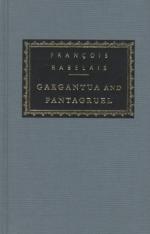|
This section contains 3,789 words (approx. 13 pages at 300 words per page) |

|
SOURCE: “Introduction: The Design of Rabelais's Christian Humanist Epics,” in The Design of Rabelais's Pantagruel, Yale University Press, 1991, pp. xiii-xviii.
In the following excerpt, Duval argues that Pantagruel must be read in the historical and ideological contexts of its origin, noting the work's unified structure and heavy reliance on Christian humanism.
What literature has in common with painting, according to Horace, is that some poems, like some paintings, are best judged when examined attentively at close range, others when viewed more globally from a distance:
Ut pictura poesis: erit quae, si propius stes, Te capiat magis, et quaedam, si longius abstes.
[AP 361-62]
Horace's point is simply that in judging large works—whether paintings or poems—the critic must not focus myopically on the weakest parts but must broaden his view to consider the overall effect of the whole. If Homer occasionally nods, he may be excused by...
|
This section contains 3,789 words (approx. 13 pages at 300 words per page) |

|


